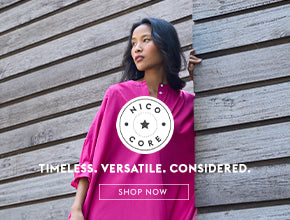How Nicobar came to define slow fashion for a new Indian generation
Cold-shoulders are in. No wait, they're out. Did you just buy that millenial pink peasant top? Oh honey, that's so Spring/Summer 2017, haven't you been keeping up? Gladiators are the new flatforms that were the new mules. And Christopher Kane, stop trying to make Crocs
happen.
It all leaves you kind of breathless and confused, doesn't it? With a wardrobe filled with clothes you tire of almost as quickly as you buy them. Enter slow fashion: the antidote to the hyper-consumption that defines the high street, a chance to slow down and fall in love with clothes the way we did when there weren't so many options clamouring for our attention. With prices that you needed to be superhuman to resist.
"I have always believed in what is now being called slow fashion, it's been a way of life forme," explains Simran Lal, the co-founder of the design studio Nicobar. "What it means for me is that clothes are a reflection of my personality and I am not defined by trends, so I still wear things that I bought many years ago and pair them with new clothes."
To Lal, whose family is also behind Good Earth, that beloved lifestyle store that made India cool again, slow fashion is defined by a strict adherence to quality. Clothes that are meant to last because they are not trend-based. Very importantly, it is a conscious choice — I have always believed in less is more and thought about the impact all this has on the environment, she adds. "That's why we want to use Nicobar as a platform to encourage thoughtful consumption and appeal to consumers who seek a connection with things they acquire. Rising star Komal Gujjar on the digital cover of Elle's August issue, dedicated to slow fashion. It's tricky, almost antithetical, trying to build a fashion and lifestyle brand while discouraging consumerism. But the folks at Nicobar are trying to win your heart first, your money second. Explains Aparna Chandra, creative head of the clothing line, We [believe in creating] products with a cultural and emotional connection. Consumers will keep an article of clothing longer than one season if they feel emotionally or culturally connected to it. Like their best-selling Nico wrap dress that flairs out at the waist, daring you to twirl in the rain or dance like nobody's watching. Or the perfectly huggable chanderi saris embroidered with little hearts, a favourite leitmotif, along with polka dots and gingham checks that betray a childlike sense of wonder.
For a business built on passion, it's no surprise that Nicobar inspires a certain sense of participation from their tribe of customers. When Raul [Rai, co-founder] writes to some of our guests, he often gets lengthy feedback, sometimes on what they feel we should launch next, to how much they love the natural fabrics we use," Lal reveals. Symbiosis is at the core of the brand's philosophy. An awareness that what's good for you is good for the planet, is good for you. Lal admits. Today, the world truly can’t afford more brands that encourage mindless consumption. There has been such a huge, unfortunate impact on the planet and it's really time to relook at how we have been living and consuming extras and artisanal cane work, all designed to lend character adding to the store’s coastal appeal.
















 GET IN TOUCH
GET IN TOUCH